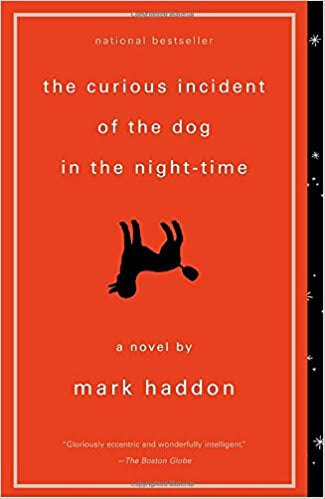"The Curious Incident of the Dog in the Night-time" by Mark Haddon

Above: "The Curious Incident of the Dog in the Night-time." - Mark Haddon - 221 pages.
He does quadratic equations in his head for fun.
I completed reading this book today.
The novel is a narrative told through the lens of a fifteen year old, high functioning autistic boy. The boy, Christopher, lives in a quiet middle class suburb of Swindon, Wiltshire, England. The book uses prime numbers (which Christopher can cite from memory to an unimaginable level) to number the chapters, rather than conventional, consecutive numbers.
Christopher discovers a dead dog, killed by a garden fork, on his neighbor's (the dog's owner) lawn. Since he likes animals (he has a pet rat) Christopher seeks to discover who killed the dog despite his father's orders to not get involved.
To solve the mystery, Christopher must engage with people... neighbors, his school teachers, passers-by etc. on a level that he has heretofore avoided. But, he has serious difficulties with engagement in that he doesn't empathize with other human beings. He can't read faces. He can't put himself in the next person's shoes. He can't understand anything more than the literal meaning of whatever's said to him.
On the other hand, Christopher possesses well developed, deep knowledge of complex mathematics. He does quadratic equations in his head for fun.
Christopher's high functioning analytical ability, juxtaposed with his seeming cluelessness in interaction with his fellow humans makes for a very unique perspective as he tells his story.
Christopher doesn't like crowds... noise... complex social situations generally.
Christopher's brain is incapable of filtering data when massive amounts of data are within his scope of awareness. Hid brain just absorbs all the available data until it, figuratively, explodes. Where, for example, you and I see a beige sofa.... Christopher sees the sofa with all of the intricate weave and cross weave of the sofa's fabric.
So, say, in a public square, with cars and people scurrying here and there amidst a cacophony of noise... where "you and I" might filter out most of what is going on, to concentrate on our own specific purpose for being there, Christopher becomes spaced out to the extent of falling down, rolling up into a ball, involuntary heaving and screaming at the top of his lungs.
The book is replete with nuggets of Christopher's wisdom. For example, Christopher likes to look at the stars. Christopher knows the zodiac:
Quote: I like looking up at the sky in the garden at night. In summer I sometimes come outside at night with my torch and my planisphere, which is two circles of plastic with a pin through the middle. And on the bottom is a map of the sky and on top is an aperture which is an opening shaped in a parabola and you turn it around to see a map of the sky that you can see on that day of the year from the latitude of 51.5 degrees north, which is the latitude othat Swindon is on, because the largest bit of the sky is on the other side of the earth.
And when you look at the sky you know you a re looking at stars which are hundreds and thousands of light-years away from you. And some of the stars don't even exist anymore because their light has taken so long to get to us that they are already dead, or they have exploded and collapsed into red dwarfs. And that makes you seem very small, and if you have difficult things in your life it is nice to think that they are what is called negligible, which means that they are so small you don't have to take them into account when you are calculating something - End Quote
In his quest to solve the mystery of the murdered dog, Christopher is forced to enter an unfamiliar world of family problems, noisy train stations, and bumbling authorities who take his unorthodox behavior to mean something other than that of a "differently abled" person.
By the way, there is a good reason for Christopher's father to want to keep his son from solving the mystery of who murdered the dog.
Christopher gets through it... he passes his top level math exams... and learns to live in a family situation where truth, once hidden, is now in full view. The story along the way is fascinating as Christopher learns to cope.
The book reads quickly.... and even if Christopher has a hard time empathizing with others, the "normal" reader of this book will have no trouble empathizing with, and better understanding, differently abled people of this sort.
It would seem that this novel should be a must-read for anyone wanting to get a better understanding of people abled like Christopher.